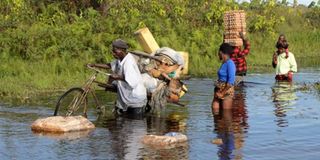Climate change studies key to saving environment

Even as we teach our primary school children about climate change and its detrimental effects, we must not tire in continuously creating awareness to all stakeholders. PHOTO | FILE
What you need to know:
- The issue: Climate change curriculum
- Our view: Even as we teach our primary school children about climate change and its detrimental effects, we must not tire in continuously creating awareness to all stakeholders.
News that climate Change studies are to be added to the primary school curriculum is welcome and long overdue given the evidently devastating effects of detrimental and thoughtless human activity that keeps growing despite many interventions by government and other stakeholders to rectify the situation.
Daily Monitor of October 22, in a story titled, “Govt starts climate change study in primary schools”, states that the National Curriculum Development Centre (NCDC), in collaboration with Plan International, have developed climate change learning materials that will be used to teach primary school pupils across the country.
The director of basic and primary education in the Ministry of Education Mr Ismail Mulindwa, says the effective way of mitigating climate change is to equip the young generation with climate change knowledge and skills. This way, they can grow up knowing the dangers of climate change. He says cases of floods in Bududa and Kasese districts have been incorporated as examples in the books.
This is a functional and relevant addition to the curriculum as it tackles an actual challenge that the country and the world at large are facing. This is a problem that needs immediate attention not only from leaders, but everyone.
Many interventions have been made such as encouraging tree planting, discouraging the use of firewood as a source of energy and providing alternatives sources, recycling and use of environment-friendly material. This is all in good stride. Unfortunately, there does not seem to be enough awareness as to the effects of climate change and, therefore, human activity that eventually plagues us is still on-going.
For many, climate change seems like a foreign problem to be attributed to countries like Australia that suffers wildfires, or those that have suffered hurricanes or massive earthquakes. But the effects of climate change are equally present and real here as anywhere else. The changes in rain patterns, landslides, extreme temperatures, floods that we experience in various parts of the country are just a fraction of the evidence of its presence here.
Even as we teach our primary school children about climate change and its detrimental effects, we must not tire in continuously creating awareness to all stakeholders. For as long as wetland degradation continues or loss of forest cover remains of minimal concern, efforts to manage climate change will remain on paper.
As is with most issues, deliberate and impactful behavioural change and effective implementation of laws and regulations that govern this area are key. There must be a commendable level of commitment from all of us if sustainable change in the right direction is to be attained.


